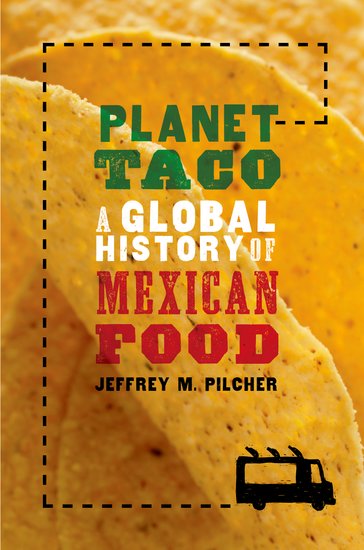On the fifth of May, many in the US and Mexico will celebrate Cinco de Mayo, the commemoration of Mexico’s victory over the French at the Battle of the Puebla in 1862. In this excerpt from Planet Taco: A Global History of Mexican Food, Jeffrey Pilcher looks at Cinco de Mayo and the first written instance of the word “taco.”
Although Manuel Payno introduced the taco to many readers in the 1890s, there was at least one prior literary reference to the snack, which likewise revealed ambiguities and social divisions within the national cuisine. This earlier mention, by another liberal author, Guillermo Prieto, came at a critical moment in Mexican history—the Cinco de Mayo victory at the Battle of Puebla by largely indigenous troops over the French invaders. But rather than exalting a national dish, Prieto used the taco to spoof the Europeans and bring them down to the level of Indians. Throughout the nineteenth century, elites perceived indigenous food as a shameful category within the national cuisine; such food was undoubtedly Mexican but associated with Aztec barbarism and backwardness. It was not a treasure to celebrate but rather a condition to overcome on the path to modernity. […]

Good Forey!
You drank wine of the maguey
until you lost your head:
ate pipián and tamalli,
tlemolito with xumiles,
and tired yourself of mextlapiles
in your tacos of tlaxcalli.
In these brief verses, Prieto first spoofed the Frenchman for going native, getting drunk on pulque while eating tamales, pumpkin seed sauce (pipián), and, most degrading of all, stinkbugs (xumiles) in chile broth (tlemolito). Unspoken in the text, but obvious to contemporaries, was an equally cruel jibe at Almonte, the illegitimate son of a Native American woman, Brígida Almonte, and the priest and independence war hero Father José María Morelos. Although the conservative diplomat moved comfortably in European royal courts, speaking fluent English and French, Prieto dismissed him with racist stereotypes of the ancient Aztecs. As a final insult, the taco served to emasculate General Forey. The mextlapil on which he tired himself was a stone rolling pin, used to grind corn by hand for making tortillas (tlaxcalli), the most stereotypically feminine task in Mexican society and one that no self-respecting man would ever be seen undertaking. What may be the first recorded taco thus served as propaganda in the campaign to expel French invaders and restore the Mexican Republic. Yet Prieto was not celebrating the indigenous troops who had helped to defeat the French.
Jeffrey M. Pilcher is Professor of History at the University of Minnesota. He is the author of several books including Planet Taco: A Global History of Mexican Food. He also edited the Oxford Handbook of Food History.
Subscribe to the OUPblog via email or RSS.
Subscribe to only food and drink articles on the OUPblog via email or RSS.




Recent Comments
There are currently no comments.